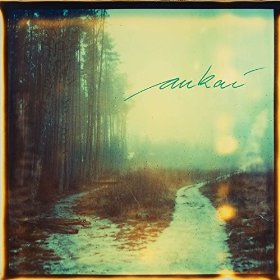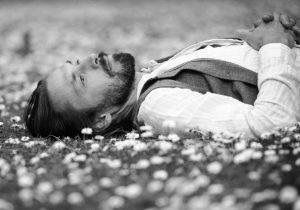Echoes June CD of the Month: Aukai
The music of Aukai is like the lost sound of an ancient civilization. It’s both familiar and new, the sound of ancestral spirits touched by a modern hand.
Aukai is the vehicle of East German born Markus Sieber. He had an early life as a Hollywood-handsome actor, but now spends much of his time performing music with his partner, pianist, harpist and singer Angelika Baumbach in the duo Mirabai Ceiba. There he performs modern takes on the Kundalini Yoga tradition which you can hear on their latest album, Sevati. But even though Baumbach brings some lovely touches on harp and piano to Aukai’s debut, there is little of that sound here: no chants, tabla or eastern instrumentation. Aukai is another kind of exotic.
Aukai operates in an area of pristine sound, rustic roots, and soulful melodies. Some of it should bring film composer Gustavo Santaolalla to mind, mostly because on more than half the tracks, Sieber plays Santaolalla’s signature instrument, the ronroco. The ronroco is a South American lute, the big brother of the charango, with a sweet, sharp sound. On tracks like “Alto Paraisio” it’s deployed in a forlorn melody, the sound of the Brazilian Savannah that inspired or perhaps a western plain at sunset.
Penguin Café Orchestra also came to mind on the small chamber group tracks like “Agua Azul.” Sieber runs an ascending Spanish-draped arpeggio on acoustic guitar against Anne Müller’s mournful cello, Bogdan Djukic’s sharp violin accents and Baumbach’s quietly dramatic piano melody. It’s light in its melodic designs but dark in its undercurrent.
 Part of what makes Aukai work are the beautifully recorded atmospheres. The spaces are deep, the echo artfully arrayed. You can hear that on the ronroco melody of “Colors of Dawn,” which rings out in space, merging with the glissando of Jamshied Sharifi’s keyboard sustains.
Part of what makes Aukai work are the beautifully recorded atmospheres. The spaces are deep, the echo artfully arrayed. You can hear that on the ronroco melody of “Colors of Dawn,” which rings out in space, merging with the glissando of Jamshied Sharifi’s keyboard sustains.
There’s a lightness of touch, a fragile delicacy to many of Aukai’s songs, but it’s not all summer breezes. Despite its title, “Feather” is a dark rumination subtly played on multiple keyboards by Sharifi: piano, Wurlitzer organ and Rhodes electric piano. They create mysterious sounds while Djukic scrapes his violin in Bernard Hermann horror moods.
Each song from Aukai paints a landscape, many of them found in the titles, like “Cachoeira.” It means waterfall in Portuguese and the piece flows in a cascade of ronroco and keyboard textures before turning into a march, driven by Alexander Nickmann’s programmed military beats.
Aukai is Hawaiian for “traveler” and that describes Markus Sieber, an explorer of a world between worlds on this album of cinematic tone poems. In its matrix of mood and emotion, intelligence and sensuousness, Aukai could not be more perfectly pitched.
~John Diliberto

